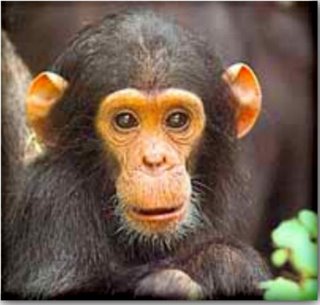"Chimpanzee Politics" by Frans de Waal
 If you believe that chimpanzee thought is much more limited than human reasoning, then this book will "rock your world".
If you believe that chimpanzee thought is much more limited than human reasoning, then this book will "rock your world".Frans de Waal, the author of "Chimpanzee Politics", is one of the most respected primatologists in the world. Dr. de Waal is the C. H. Candler Professor of Primate Behavior at Emory University, and Director of the Living Links Center at the Yerkes Regional Primate Research Center.
"Chimpanzee Politics" was written in 1980, early in Dr. de Waal's research career. However the information that he presents is as relevant today as it was 27 years ago.
In this book, Frans details the power struggle among a group of chimpanzees that were living on an island at the Arnhem Zoo. This Zoo is located in the Netherlands. His data covers many years.
The story centers around the struggle for alpha male supremacy among a small group of males, which included Yeroen (the grizzled old veteran), Nikkie (the hot headed upstart), and Luit (the calculating politician). Each chimpanzee had a different method for seeking power. However they employed many similar techniques, that could be observed and predicted with a significant degree of certainty. Included were:
- When an alpha male was deposed, he would form an alliance with the other member of the triad who was not in power. This partnership would then seek to undermine the influence of the leader.
- The alpha male would seek support among the females. The "pretenders to the throne" would do the same. The females had a great deal of influence over who became the leader - and how long that leader stayed in power.
- Grooming was extremely important in resolving conflicts. Dr. de Waal's statistics showed that chimps who challenged the leader also groomed with that leader more frequently than at other times. Grooming appeared to be a way to reduce tension, and to re-establish an emotional bond among sparring chimps.
I was surprised by the complex group dynamics among these three chimps. Some campaign strategies took place over months, and involved a degree of planning and sophistication that I previously thought was limited only to humans. Many times, while I was reading this book, I felt like I was reading the chronicle of a U.S Presidential campaign. Machiavelli's book "The Prince" also came to mind.
The data collection methods of Dr. de Waal and his research team were scientifically sound, and rigorous in their execution. This gave me confidence that anthropomorphism did not have a significant role in the book's conclusions.
When I finished reading "Chimpanzee Politics", I had a great deal more respect for our closest animal cousins, and was inspired to find out more about chimpanzees. This book was also "a good read". The prose flowed smoothly, and was not overly inundated with technical jargon. As a result, I was able to finish the book in three days.
Whether you are a devoted follower of primate science or are simply interested in chimpanzees, I believe that you will find reading "Chimpanzee Politics" to be an enjoyable and educational experience.
.gif)










.jpg)
No comments:
Post a Comment